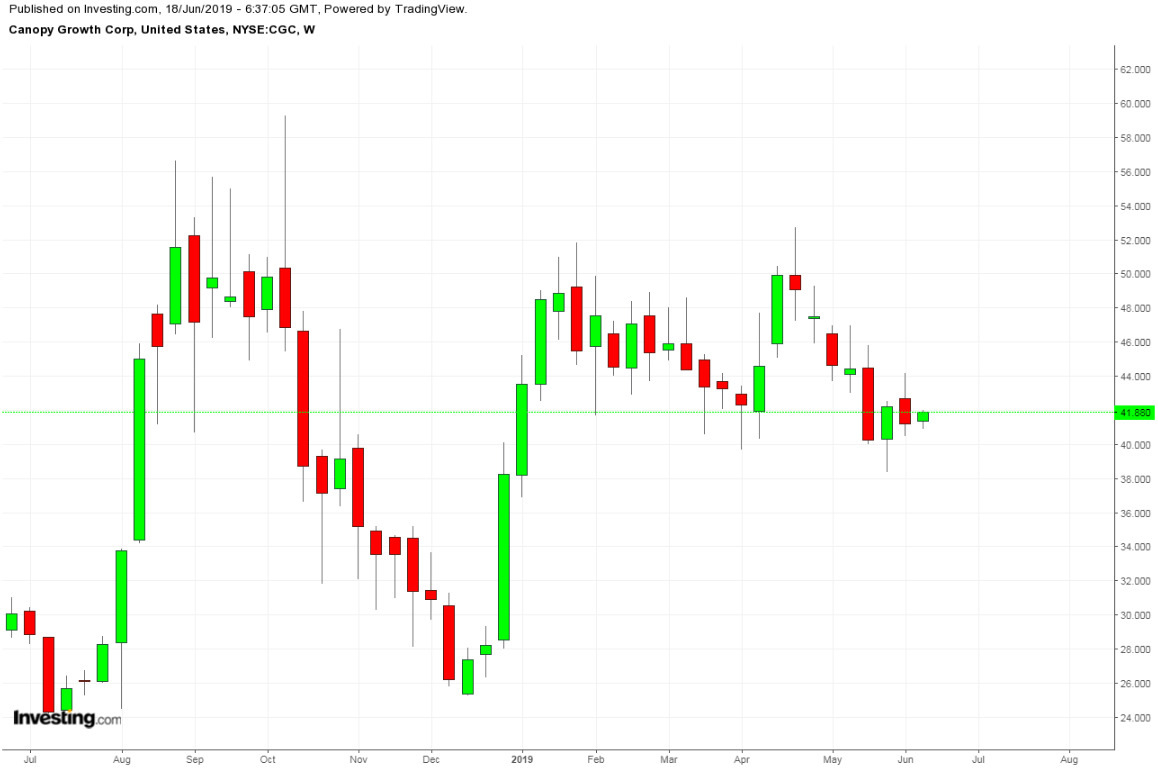Shares of the Canadian-based cannabis company Canopy Growth (NYSE:CGC), (TSX:WEED) were up 1.70% in U.S. trade on Monday. The reverse in the stock’s trajectory of late came as shareholders concluded a vote earlier in the day on the US$3.4-billion deal to acquire the U.S.-based marijuana grower Acreage Holdings (OTC:ACRGF).

Although the vote is expected to ratify the deal, the acquisition of the New York-based cannabis firm will not go into effect until marijuana receives Federal legalization in the United States. That may not be immediately forthcoming, however. Nevertheless, it isn't necessarily the physical acquiring of Acreage that's critical at the moment. Rather, it's the strategic position behind the move that Canopy Growth was looking to secure.
Strategic Advantage, For Now
It gives Ontario, Canada-based Canopy—the largest cannabis company in the world by market cap—access to the largest marijuana market in the world, as Acreage is licensed in 20 U.S. states. Securing a multi-state American partner is a major move in Canopy’s overall plan to maintain its status as a dominant player in the continually evolving cannabis sector.
Staying at the top of the emerging cannabis sector is becoming more and more important, and increasingly more difficult, especially for Canadian companies despite their early lead. The difficulty Canadian companies are facing is the prospect of the legalization of marijuana in the U.S. at the Federal level. As the U.S. inches its way closer to that point, companies are bracing to prepare for—and weather—the shift this will cause in the sector’s landscape.
It will undoubtedly put the U.S. in a position to threaten Canada’s current leadership in the sector. Despite it being the first G7 country to legalize the substance, which allowed investment money to flow, Canada risks losing its early lead due to its relatively small population.
With fewer people than the population of California, there is a limit to how much marijuana can be sold. On the upside, however, this has contributed to Canadian companies establishing ties and markets in other countries where restrictions are easing.
This edge in the global market is, for now at least, protected since U.S.-based operators can't legally operate across the 50 states since they're not able to partner with companies and governments in other countries because marijuana remains illegal on the Federal level.
Building Brand Leadership
Still, there's a difference between being a producer of a global commodity and the huge financial rewards that come with being a brand leader. And this is where Canadian companies risk being disadvantaged in favor of their American rivals despite their head-start. Canadian regulations restrict brand marketing.
Unable to market their product with recognizable brands, Canadian companies have a huge obstacle to overcome in an effort to connect with consumers. And let’s face it, when it comes to profit margins, branding is a big deal.
Everyone from the makers of Kleenex (NYSE:KMB) to Corn Flakes (NYSE:K), to companies like McDonald’s (NYSE:MCD) to Microsoft (NASDAQ:MSFT) will attest to that. No one really thinks about where these products come from; consumers simply know and trust the brands.
But by forging a partnership with Acreage in the U.S. now, Canopy has a workable strategy to maintain its momentum going forward. And news of this momentum is what Canopy is keeping front and center. To that end, on Monday it issued an update on its international operations and activities in the emerging medical cannabis and CBD markets.
Among the highlights is a multi-year deal it has signed in South America with Colombia-based Procaps, a manufacturer of over-the-counter medications and supplements. The company exports to more than 50 countries, including the U.S. where it is certified with the Food and Drug Administration. Canopy plans to use Procaps expertise and manufacturing capacity—especially in the field of gelcaps—to serve the growing CBD markets throughout Latin America.
Canopy also pointed to its medical cannabis division, known as Spectrum Therapeutics, which began selling medical cannabis in Australia last month. Spectrum is expected to supply patients with imported medical marijuana as it continues to build a growing facility in southeastern Australia.
Canopy also announced it has secured growing licences in Denmark and for two facilities in South Africa.
All of this is setting the stage for Canopy’s next piece of much-anticipated news, the release of its fourth quarter results, after the close on Thursday, June 20. Strong production and sales growth are expected to continue.
In the third quarter, Canopy reported revenues of C$97.7 million (USD $72.77 million), up from C$21.7 million (USD $16.16 million) for the same quarter in 2018, while net sales were at C$83.05 million (USD $61.86 million) compared with C$21.7 million (USD $16.16) for the corresponding quarter the previous year. Given the company’s production expansions, these figures should increase accordingly.
The metric to watch, however, will be how much will remain in the company’s cash reserves. If both those sets of numbers are healthy, Canopy's momentum is likely to continue.
